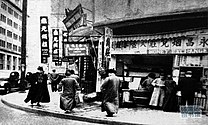Red Rose, White Rose (novella)
[3] With finely detailed writing, the novel explores the women's survival status, tragic fate, and loss of self-consciousness in a patriarchal society.
Marry a red rose, and eventually she'll be a mosquito-blood streak smeared on the wall, while the white one is 'moonlight in front of my bed.'
Marry a white rose, and before long she'll be a grain of sticky rice that's gotten stuck to your clothes; the red one, by then, is a scarlet beauty mark just over your heart.
Returning from studying in Edinburgh with excellent grades, Zhenbao is hired by a famous foreign trading company in Shanghai as a senior staff.
[3] For the convenience of transportation, he rents a room from his classmate Wang Shihong, who is married to the beautiful and charming Jiaorui.
One day, he meets his "red rose" Jiaorui by chance, who has remarried and is carrying a child in her arms, appearing to him old and withered.
He works conscientiously, supports his mother and brother, and even gains a great reputation as "Lucia Hui" for rejecting his first lover Rose's sexual temptation during his time of study in France.
[6] On one hand, he loves the spirit and flesh of the red rose Jiaorui, but because of secular obstacles and traditional views on marriage, he has to refuse to marry her; on the other hand, he loves the white rose Yanli's unsullied reputation but extremely dislikes her vapidity after marriage.
Wang Jiaorui (王娇蕊) is an overseas Chinese from Singapore who became a party girl while studying in London.
Summoning her courage, she confesses the affair to her husband and files for divorce to marry her true love.
However, it is actually because he is unwilling to take responsibility and he believes that "marrying her, then transplanting her to his hometown – that would be a big waste of time and money, not a good deal at all.
At the time of the novel's publication, women with such tragic circumstances were not rare in a Chinese society dominated by traditional feudal culture.
For the white rose Yanli, her difficult upbringing makes her content with a life of humiliation and lowliness.
Even red rose Jiaorui, whose views are influenced by the May Fourth Movement and can pursue self-liberation and true love openly, is regarded by men as a plaything and a woman who cannot be married.
At the same time, calls to promote equality between the sexes were continuously strengthened under the influence of the global feminist movement.
Although male-dominated society has not been overturned in China, it gave birth to a small group of women with independent ideas.
[1] Reflecting the decline of the old culture in this novel, Zhang's original intention is not to criticize, but to show the real tragedies and comedies of ordinary people during that time.
[10] The novel was thought to be a reflection of story of Chang and Hu Lancheng (Simplified Chinese: 胡兰成, Feb 28, 1906 – July 25, 1981).
"[11] Similarly, the writer Yu Bin once compared Zhenbao and Hu Lancheng in his book: "With his (Hu Lancheng) self-centeredness and male chauvinism, the most wishful thinking is just the secret wish of all men in the world – that is, Tong Zhenbao's thoughts in the novel Red Rose, White Rose.
"[12] Regarding the writing style of the novel, according to writer Liu Chuan E: "Eileen Chang wrote in several places in Red Rose, White Rose about Zhenbao and Jiaorui's flirting styles, such as the temptation to 'break the law', how the heart-to-heart conversation is like an apartment anyone can live in, and the details such as over-skilled kissing are so brilliant.
"[13] Red Rose White Rose, a 1994 Hong Kong movie directed by Stanley Kwan (Simplified Chinese: 关锦鹏, born October 9, 1957), starring Joan Chen, Winston Chao and Veronica Yip, entered into the 45th Berlin International Film Festival.

